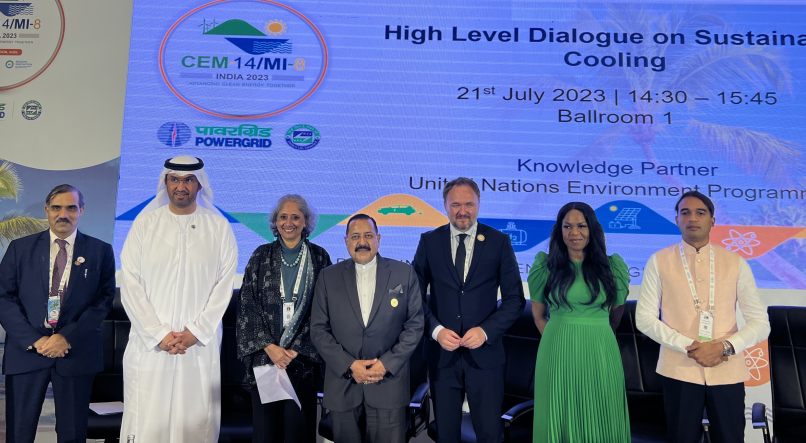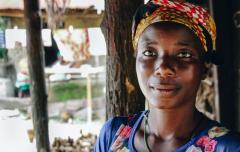COP28 President-Designate, Ministers, SEforALL and UNEP call for action on sustainable cooling at Clean Energy Ministerial
The Government of India, as G20 President, and the Government of the United Arab Emirates, which holds the COP28 Presidency, put cooling firmly on the international energy agenda today at the High-Level Dialogue on Sustainable Cooling, which was part of the Clean Energy Ministerial-Mission Innovation Summit in Goa, India.
At a time when unprecedented heatwaves are gripping many regions of the world, today’s event highlighted how urgent action is needed to deliver sustainable cooling solutions that will protect people without hastening climate change. Several ministers and high-level representatives rallied behind the Global Cooling Pledge, its calls to action on sustainable cooling, and the steps the global community must take to achieve a “Cool COP28”, specifically one that sparks commitments towards improving sustainable cooling access.
The Global Cooling Pledge is an initiative led by the COP28 Presidency and supported by the Cool Coalition and its partners, including SEforALL. As highlighted by Ms. Ligia Noronha, UN Assistant Secretary-General and Head of the New York Office of UN Environment Programme (UNEP), “the Pledge offers state and non-state actors a unique chance to enhance commitments to climate mitigation, to adaptation, resilience and investments towards sustainable cooling.”
Previewed earlier this year, it calls for progress on nature-based solutions, super-efficient appliances, food and vaccine cold chains, district cooling, and National Cooling Action Plans, among others.
During the event in Goa, Dr. Sultan al Jaber, COP28 President-Designate and the UAE’s Special Envoy for Climate Change, said, “We have a unique opportunity to deliver a significant collective response to the cooling challenge via this very important initiative – the Global Cooling Pledge. This Pledge aims to improve efficiency and increase access to sustainable cooling. It is gaining momentum, with more than 20 early supporters, including India and Denmark.”
The COP 28 President-Designate was joined by Ministers and international energy sector leaders to call on governments to join the Global Cooling Pledge in the lead up to COP 28.
Speaking on behalf of the Government of Denmark, Dan Jørgensen, Minister for Development Cooperation and Global Climate Policy, declared, “It is clear that achieving universal access to sustainable cooling requires international corporation, dedicated climate finance, and leadership from key players.” He then urged decision-makers from government, private sector and civil society to raise awareness and advocate for a global approach to sustainable cooling.
Recent record-breaking temperatures, including some exceeding 50 degrees Celsius, accentuate the need for progress on sustainable cooling for all. New data from the Chilling Prospects research series show progress is not moving quickly enough to beat the heat. Around 1.12 billion people are still at high risk due to a lack of access to cooling, a decrease of just over 20 million compared to last year. The most acute and dangerous cooling access gaps are in the poor rural areas of Sub-Saharan Africa and in the growing cities in high-temperature regions of the Global South.
In these areas, people face risks to their health, safety and productivity because they can’t access the cooling they need. Bringing them cooling solutions is therefore a critical development and climate issue, because rising demand for cooling needs to be met sustainably. Currently, conventional cooling, such as air conditioning, is already responsible for over seven per cent of global greenhouse gas emissions. These emissions are on a path to doubling by 2050 without stronger action.
SEforALL is pleased to work with the Governments of India and the UAE, as well as the Cool Coalition to advance action on sustainable cooling in the run-up to COP28 and beyond. Together, we will be working to generate:
- Pro-poor, pro-rural innovation to put sustainable solutions in reach.
- More effective financing for the productive use of energy for cooling, building on the result-based financing that works for electrification.
- Strong policy commitments from national governments on codes, standards and integrated electrification planning that includes cooling.
- Financing for data, technical support, and project implementation that can turn a commitment into results for those at highest risk due to a lack of access to cooling
During the High-Level Dialogue, Damilola Ogunbiyi, CEO and Special Representative of the UN Secretary-General for Sustainable Energy for All, and Co-Chair of UN-Energy, highlighted how SEforALL is already supporting the Governments of Kenya and Ghana to mobilize investment in sustainable cooling solutions for the most vulnerable. We have also launched our second #ThisisCool youth innovation challenge, with winners to be profiled at COP 28.
In Malawi, SEforALL ensured that the cooling, energy, and associated investments needs to guarantee vaccine cold chains for the COVID-19 response were included in the Government’s Integrated Energy Plan. And in Madagascar, we are going a step further by including vaccine and agricultural cold chains in the support provided to the Government of Madagascar to develop their Integrated Energy Plan.
“Over the next few months, SEforALL is looking forward to working with you all on the success of the Global Cooling Pledge, and subsequently support countries to implement the solutions after the Pledge,” Ogunbiyi expressed at the event in Goa.
The effects of a warming planet, insufficient action on climate change adaptation, and the growing impacts of extreme heat on human lives underline the urgency of the issue. With 2023 representing a year of opportunity for new commitments to sustainable cooling, let us use the moment to prioritize the opportunity of Cooling for All for equality of opportunity, productivity, and health of the most vulnerable.


